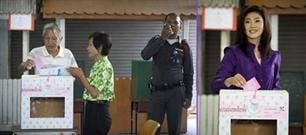Thai people's election day
On the morning of July 3, millions of Thai voters began going to the polls to choose representatives of 40 political parties for the new term of the House of Representatives.
This is considered an important step to orient the country's future and help Thailand escape the political crisis that has lasted nearly 6 years.
As of 8am, around 94,000 constituencies across the country have opened. Of the 500 new House of Representatives seats, 375 are elected directly in constituencies and the rest are selected through the party-list system (based on the proportion of votes each party receives).

The election developments are being reported live by the Thai media, with the preliminary results expected to be announced around 9-10pm on the same day. The Thai people hope that this election will help choose a good leader who listens to the opinions of the people.
Thai people in the restive southern regions also have high hopes for this event, hoping it will bring stability to the region, which has great potential for economic development.
“We want peace more than anything,” said a Thai resident in Pattani province. “I want a government that truly cares about its people and one that can solve the problems in the three southernmost provinces.”
The Thai police force has deployed 100,000-180,000 personnel to ensure security at polling stations and the military is also ready to play a supporting role when needed. In order to minimize unexpected incidents, a ban on the sale and consumption of alcohol and beer from 6pm on July 2 to 0am on July 4 has been issued, and entertainment venues must close early for 2 nights (July 2-3).
In addition to pledging to hold a free, transparent and fair election in accordance with international standards, the Thai Election Commission has invited representatives from the European Union (EU) and 10 countries to monitor the general election. A crime crackdown has also been launched in conjunction with this early election.
This election is seen as a test for Prime Minister Abhisit Vejjajiva, whether he and his Democrat Party can maintain their leadership position in the country. In his final message before the election, Mr. Abhisit Vejjajiva called on the people to vote for his party instead of choosing forces that support street violence. Meanwhile, Ms. Yingluck Shinawatra, the leading candidate of the Pheu Thai Party for the position of Prime Minister, also urged voters to vote for this party for the future of Thailand.
The results of public opinion polls before the election day all showed that the Pheu Thai Party had a large advantage over the Democrat Party. According to analysts, this is also understandable because Ms. Yingluck Shinawatra is the sister of the ousted Prime Minister Thaksin. Although not a copy of Mr. Thaksin, it is clear that Ms. Yingluck Shinawatra inherited from her brother the support of a large number of voters in rural areas. Meanwhile, behind the Democrat Party is still only the middle and upper classes with a small number, concentrated in the capital Bangkok and some urban areas.
With such a balance, it is likely that Ms. Yingluck Shinawatra will become the first female Prime Minister in Thailand. However, the possibility of the Pheu Thai Party winning a resounding victory (270-300 seats) is very difficult, when there are up to 40 large and small parties registered to participate in this election. Although it can win the election, the Pheu Thai Party will not win enough seats to form a one-party government, so it will have to form a coalition with small parties. Meanwhile, Prime Minister Abhisit's Democrat Party is supported by the military, and it is not impossible that although it comes in second, it can still form a coalition government.
Thailand has more than 47 million voters. Previously, on June 26, about 1.6 million voters exercised their rights and obligations as citizens in early voting. After the election results are officially announced, Thai MPs will convene their first session within 30 days to elect the Speaker of the House of Representatives, who will also be the President of the Thai National Assembly, and elect the Prime Minister in the following weeks.
In the context of political instability and social division showing no signs of abating soon, the formation of a new government after the election is a topic of interest to many people, especially in the case that no party wins an overwhelming number of seats.
According to VOV






